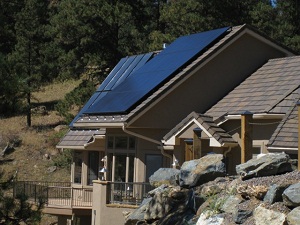Colorado RESA fee upsets some solar owners
 Some Colorado homeowners with solar arrays are upset that utilities in Colorado recently started assessing a Renewable Energy Standard Adjustment (RESA) fee on their monthly electric bill. The RESA fees support future renewable energy incentives and projects in the state.
Some Colorado homeowners with solar arrays are upset that utilities in Colorado recently started assessing a Renewable Energy Standard Adjustment (RESA) fee on their monthly electric bill. The RESA fees support future renewable energy incentives and projects in the state.
Under the state-mandated RESA fee, owners of grid-tied solar systems are assessed $1.30 a month fee for systems up to 5 kilowatts in size, $2.05 a month for systems between 5 kW and 10 kW and $4.11 a month for systems over 10 kW.
“We’ve had a couple of customers call about it,” said Xcel Energy spokesperson Mark Stutz. “Whatever we collect from these folks, that is rolled back into the RESA itself. It is used to pay for more solar systems for future customers.”
Energy customers in Colorado are also assessed a 2 percent RESA charge on their power bill to support more clean energy development in the state. But as more people adopted solar, the fund replenished by fees has dwindled. When Colorado passed the expansion of its renewable energy standard into law in 2010, it added this additional fee for owners of solar systems.
The fee has riled some photovoltaic owners, like Gary Norton. "I just paid $13,000 which is my fair share going many years into the future," he told ABC-affiliate KMGH Denver’s Channel 7. The full cost of that system was $40,000, the cost of a decent new car. The rest was paid for through state and federal incentives.
The majority of the costs, $27,000, were paid through Xcel’s Solar Rewards program, according to Stutz.
Despite having a solar array, Norton’s system also is still tied to the grid, allowing him to reap benefits of being net-metered in Colorado. Under the state’s net-metering laws, he’s credited for excess energy produced at retail rates and offered a payment equal to the average hourly incremental cost.
“The guy says he doesn’t use Xcel Energy. We still have to provide electricity to him,” Stutz said. “Even if Norton produces more energy than he uses during the day, he still uses grid-power at night. There’s a cost associated with providing him [that power]. There are wires—things we still need to maintain going to his house.”
While $12.36 a year isn’t a lot to pay for benefitting from incentive programs, Norton questioned whether or not Xcel would raise such fees in the future. “There are no plans from Xcel Energy to increase that fee,” Stutz said.



